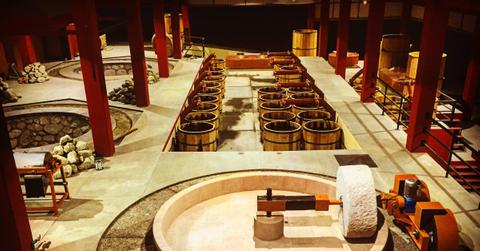Former Environmental Attorney Creates Zero Waste Liquor In Mexico
Mezcal, tequila's cousin, has been made in the same traditional way for decades. Entrepreneur Richard Bretts has taken a more environmentally sustainable approach to making this Mexican liquor by adding new tweaks t old methods. In doing so, he's been able to make a more eco-friendly mezcal.
Updated May 28 2019, 11:36 a.m. ET
In recent years, mezcal has grown in popularity and is now a commonly enjoyed spirit outside of Mexico. Like most alcoholic beverages, producing mezcal requires a significant amount of energy and materials, and as a result, the process can create a large carbon footprint.
To tackle this issue, Richard Bretts took a new look at traditional mezcal production methods. As a former environmental attorney turned mezcal enthusiast Bretts had a fresh perspective on the industry. He found that many conventional steps could be tweaked with more environmentally friendly approaches, so he set out to carefully upgrade the old process.
So far the new approach has been successful. Brett’s company, Sombra Mezcal opened a new distillery a few months ago near San Juan and San Luis del Rio by Oaxaca. The agave used for the mezcal is organically grown up to 8,000 feet up in the mountains.
After four to twelve years, the plants are harvested and heated by a strong fire. One of the many things that the company focuses on is using responsibly sourced wood. Roasting the agave is an essential step in the process, so the team works to use only certified wood from sustainable wood farms and forests nearby.
Apart from carefully sourced wood, the team also considers animal rights and the role of horses in traditional production methods. After roasting, the agave is traditionally ground up by a horse-turned millstone. While breaking with ancient tradition is uncommon in the area, Bretts decided this particular practice was not necessary to create the perfect mezcal. Today the distillery uses the same grinding tools and process but has replaced animal labor with an electric mill powered by solar panels.
Apart from solar energy, the sky also offers another sustainable opportunity for the group in the form of water conservation. The team installed three underground tanks to capture 100,000 liters of rainwater collected from the roof.
After crushing the roasted agave, the team ferments and distills it. The mezcal distilling process leaves behind plenty of excess material which often finds its way into nearby rivers. This waste can harm the environment and fish in the river because it disrupts the oxygen levels and natural acidity of the water. To break from industry practices and find a better way to manage the waste responsibly, Sombra turns it into compost for local farmers and is also looking to use it as biofuel. The team is also making adobe bricks out of the material and can sometimes make up to 700 bricks a day.
When the process is done, the mezcal is poured into bottles made from locally recycled glass, and the final touches and labels are applied by hand. Betts expressed that he hopes his company’s new approach will set an example for other liquor producers, “All in all, these are the broad strokes of our vision to help the mezcal industry grow in a responsible way that does right by Oaxaca and her people. While we understand that all of these steps may not be practical for every producer, we do believe that at the very minimum, dealing responsibly with the waste products is essential for any conscientious producer and we encourage everyone to join us in doing so.”
